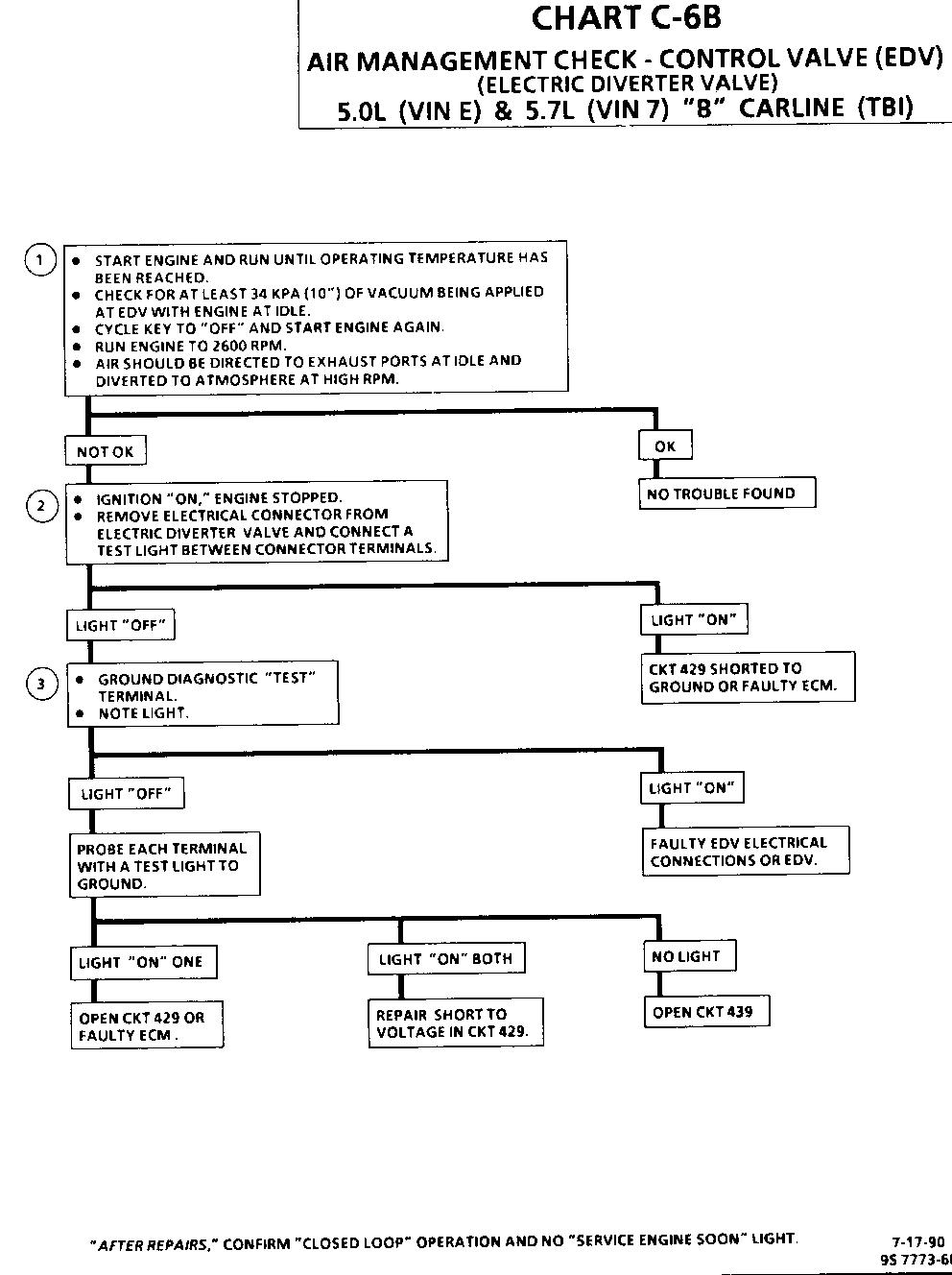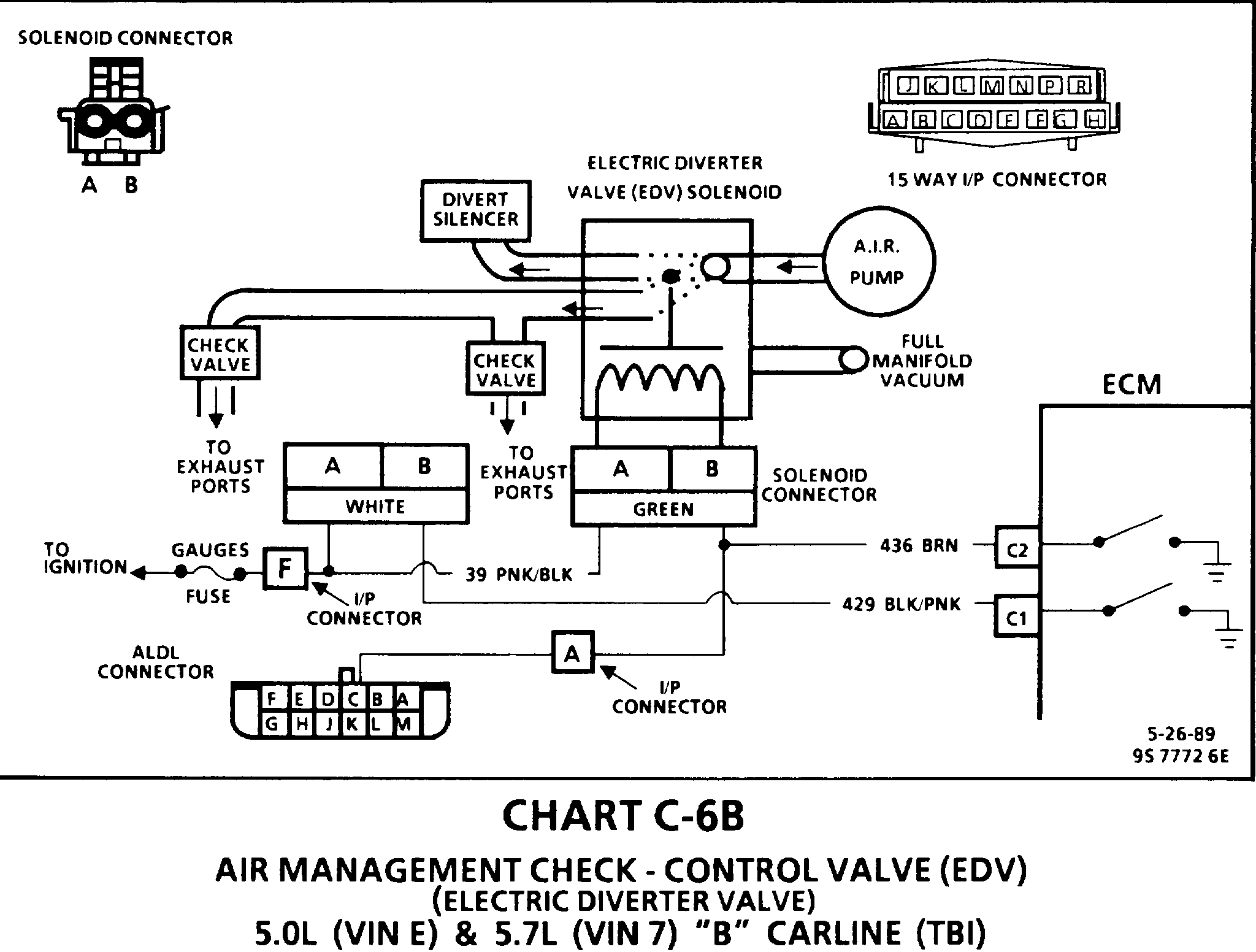SERVICE MANUAL UPDATE-SEC.6E2 ADDING SERVICE DIAGNOSTICS

Subject: DRIVEABILITY AND EMISSIONS ADDING SERVICE DIAGNOSTICS
Model and Year: 1989 CAPRICE WITH 5.OL (VIN CODE E) AND 5.7L (VIN CODE 7) ENGINES
TO: ALL CHEVROLET DEALERS
Some 1989 5.OL (VIN E) and 5.7L (VIN 7) "B" cars were built with an Electric Divert Valve (EDV) type AIR system.
The diagnostic chart and facing page service information in this bulletin should be added to the end of Section "6E2-C6" in the DRIVEABILITY AND EMISSIONS section of the 1989 "B" Carline Service Manual.
CHART C-6B AIR MANAGEMENT CHECK - CONTROL VALVE (EDV) (ELECTRIC DIVERTER VALVE) 5.OL (VIN E) & 5.7L (VIN 7) "B" CARLINE (TBI) -------------------------------------------------------------------------- Circuit Description:
An electric air control valve solenoid directs air into the exhaust ports or the atmosphere. Air is directed to the exhaust ports whenever the engine is started and the coolant temperature is above about 20 C (68 F). When the vehicle is started and the coolant temperature is below about 20 C (68 F), the air will be directed to the atmosphere until the coolant temperature rises above about 20 C (68 F) and the engine control system enters closed loop mode. When the vehicle is moving, the air will be diverted to the atmosphere at coolant temperatures above about 55 C (131 F). If the ECM detects higher than normal battery voltage or if a diagnostic code currently exists, air will not be directed to the exhaust ports.
Test Description: Number(s) below refer to circled number(s) on the diagnostic chart.
1. If the EDV does not have 34 kPa (10" Hg) of vacuum applied to it, check for a pinched, plugged or leak in the vacuum hose. The ECM should energize the EDV at idle when the engine is a operating temperature. This will allow air to be directed to the exhaust ports. At high rpm, between about 2000-2500, the ECM will de-energize the EDV which will divert air to the atmosphere.
2. Tests for a grounded Electric Diverter Valve (EDV) Circuit. On a normal system, the light will be "OFF."
3. Checks for an open control circuit. Grounding diagnostic "test" terminal will energize the solenoid if ECM and circuits are normal. In this step, if test light is "ON," circuits are normal and fault is in valve connection or valve.
Diagnostic Aids:
Removing diverter/silencer will allow easy access for determining if air is being diverted to atmosphere.


General Motors bulletins are intended for use by professional technicians, not a "do-it-yourselfer". They are written to inform those technicians of conditions that may occur on some vehicles, or to provide information that could assist in the proper service of a vehicle. Properly trained technicians have the equipment, tools, safety instructions and know-how to do a job properly and safely. If a condition is described, do not assume that the bulletin applies to your vehicle, or that your vehicle will have that condition. See a General Motors dealer servicing your brand of General Motors vehicle for information on whether your vehicle may benefit from the information.
